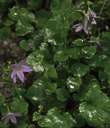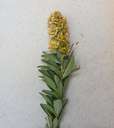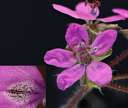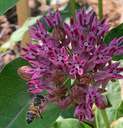Ask the Botanist
Our ace botanists are here to help you identify wild New England plants and to answer questions about their ecology and conservation. When posting a question, please provide the location, habitat (e.g. river, mountain, woodland), and photographs of the plant.
Everyone can read the answers, but only logged-in users can ask questions. Log in to ask a question.
All Questions and Answers
Recently Answered Questions
-

- Question
- Help identifying this plant in our yard. Shady location, NW Connecticut.
- Answer
- Dear Don, good morning. Please forgive the long delay in responding, but it has taken a long time to determine which species you photographed. The plant is likely Campanula poscharskyana (Serbian Bellflower). This species has not been documented as "wild" in New England before. If you feel this plant is naturalized (i.e., growing outside of cultivation), I would appreciate communicating with you by email about this and possibly including it in the flora. I can be reached at ahaines@nativeplanttrust.org, thank you in advance for your help. (Monday, 24 November 2025)
-




- Question
- Is this tree located in Benson, VT green ash (F. pennsylvanica)?
- Answer
- Dear mmchugh, good morning. The plant certainly looks like Fraxinus pensylvanica. The pubescence of the branchlets and leaves are good identifying characters, as are the lateral leaf scars that are not strongly concave on the distal (i.e., upper) margin. Fraxinus nigra would often have another pair of leaflets (or more) and would show sessile (i.e., unstalked) leaflets. Best wishes. (Tuesday, 28 October 2025)
-
- Question
- I posted a question earlier about a plant that I thought could be Roseroot. Looking carefully at the plant and the flowers (photos were posted earlier), I think I was wrong and that the plant might be Narrow leafed bush clover, Lespedeza angustifolia. Close look at the fresh flowers, they seem to be cream colored and there are purple spots. And the fuzzy leaves seem to be in three leaflets when they are pulled away from the stalk. And it’s a local plant, not an unusual one. Carol Knox
- Answer
- Dear Carol, good morning again. You are in the correct genus, but Lespeza angustifolia has very narrow leaflets and typically occurs on coastal plain pond shores (i.e., in a specialized habitat). The plants are more likely Lespedeza capitata or a hybrid with that species. Best wishes. (Tuesday, 28 October 2025)
-




- Question
- A friend, (Cathy Williamson), found & photographed this plant in West Falmouth, MA. Her phone id was 'Goldenroot'. Because she hadn't seen this plant before, she asked me to id it for her. I thought perhaps Rhodiola rosea L. using my guides and the NE Flora. Cathy collected a flowering stalk, which I photographed and pressed. Attached are Cathy's photos of the collection site and my photographs of the collected stalk. Normal range for Rhodiola is not MA, so maybe I'm wrong. Thanks, Carol Knox
- Answer
- Dear Carol, good morning to you. This is a species of Lespedeza (bush-clover). I'm not able to give you a confident identification with the images supplied, in part due to the extensive hybridization that occurs in this genus. The corolla color suggests and leaflet dimensions suggest this is allied to Lespedeza capitata. It may be that species or a hybrid with it. I would not be able to tell you more without a specimen. Best wishes. (Tuesday, 28 October 2025)
-


- Question
- This plant has self-sown on the southwest side of my house in South Berwick, Maine, on the edge of neighbor's driveway.
- Answer
- Dear Madeleine, good morning. You have photographed a species of Galium (bedstraw). While the phoograph does not provide me with the details I need to confidently identify the plant, it is consistent with Galium mollugo (whorled bedstraw) and its allies. This is a common species in New England, introduced from Europe, with white flowers. (Tuesday, 28 October 2025)
-

- Question
- Is this Senna obtusifolia? It’s growing in my West Roxbury backyard. i’ve never seen it here before. Thank you!
- Answer
- Dear hgengenbach29@gmail.com. It certainly looks like it could be Senna obtusifolia. I can't see the extrafloral gland on the leaf rachis well enough to tell you with certainty. I don't know if you have additional images that would show this gland clearly--but these would be helpful. Senna obtusifolia is a rare introduction to New England. Best wishes. (Tuesday, 28 October 2025)
-

- Question
- There is a very small flower growing at the edge of our sidewalk in Kelowna BC. Google search says its likely stork's-bill. Any idea what the small pattern that appears on 2 of every 5 petals- Its advantage or use?
- Answer
- Dear gordonplant, good morning. I believe you are correct, this appears to be a member of the Geraniaceae. The patterns that you see at the base of each petal have a function often in directing pollinators to the reward (or directing them to the correct portion of the flower for proper pollination). In some species, these spots, stripes, patterns, and hairs can be the location of nectaries, in other cases they are nectar guides or other coloration that helps the flower better position the pollinators. I hope this is useful. Best wishes. (Tuesday, 28 October 2025)
-



- Question
- These images are from a tree I bought about 10-15 years ago from NPT labeled as Red Mulberry. I have read the description on GoBotany about how to differentiate from white mulberry but cannot see the expected stiff, flattened hairs on the leaf blades or anything that seems "scabrous." Elsewhere when I have looked at pictures of red mulberry I sometimes see very elaborately shaped leaves with deep lobes and there is nothing like that on my tree. Maybe actually a white mulberry or a hybrid?
- Answer
- Dear Barbara, good afternoon. Identifying Morus species from photographs is really difficult. If you could just press 2 or 3 leaves within a heavy book and mail me the leaves, I could assist you. My email as ahaines@nativeplanttrust.org if you want to discuss further. Best wishes. (Friday, 19 September 2025)
-



- Question
- I found a few of these unusually colored (and shaped) leaves growing on a bog rosemary shrub (Andromeda polifolia) along Big Brook on Big Lake, Washington county, ME on June 26, 2025. I thought it might be some kind of hemiparasite, but am coming up emptyhanded. Toadflax has come up, but the leaves on my sample are distinctly pink only. The flowers/fruits that I see appear to belong to the bog rosemary Any direction you can point me in would be greatly appreciated, Debbie.
- Answer
- Dear Debbie, good morning. I have seen such leaves before on members of the heath family, but I have not yet identified why they are this way. I have always assumed that there may be some type of infection (microorganism), but I am not certain of this. I will pass along to you what causes this if I encounter an answer. Best wishes. (Monday, 28 July 2025)
-


- Question
- I just posted a series of pictures of my purple milkweed. I am fortunate to have at least 3 healthy, large seed pods in development. My questions for you are these: 1. When should I separate the seedpod from the host plant? 2. When should I remove the individual seeds from each seed pod? 3. Once removed, separated and dried, what is the best technique to overwinter the seeds limiting mold risk but not having them dry out completely. Appreciate any and all advice. Gary
- Answer
- Dear Gary, good morning. I need more background/context to answer your question. Perhaps you could contact me at ahaines@nativeplanttrust.org to initiate a conversation about the beautiful milkweed plants that you have posted images of. Looking forward to connecting more about the seed collection. Best wishes. (Monday, 28 July 2025)
